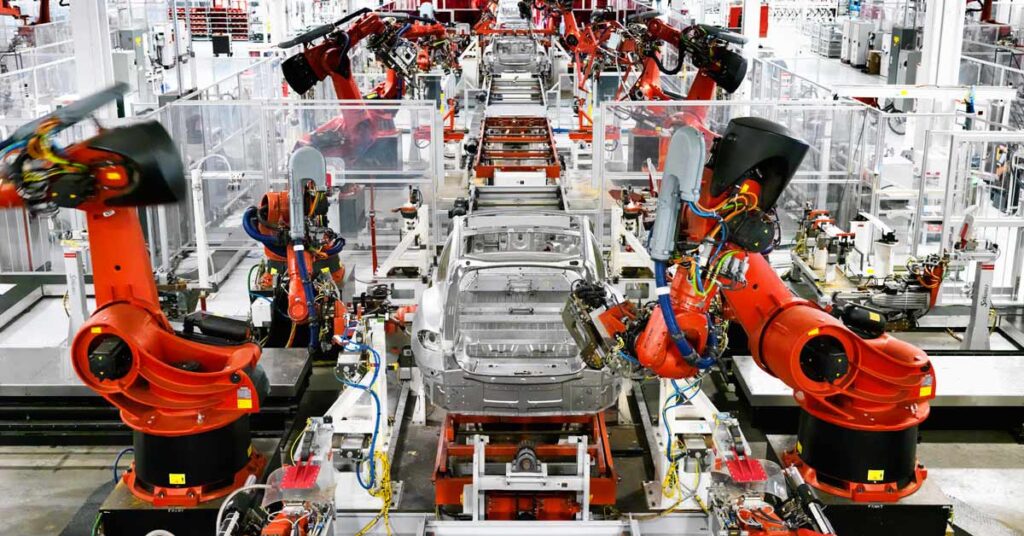
Automation and robotics afectation to labour market
BIEL SALAT│27/01/2023
In the mid-18th century, Europe found itself immersed in an innovative and ingeniously different situation. At that time, probably criticized and unwanted, but nonetheless, with hindsight, most of us would agree that it represented a great advance in our society.
This period, cataloged by historians as the Industrial Revolution, involved the adoption of a new instrument, the machine, which changed the way we understood the world up until then. It entailed a significant remodeling and evolution of economic, social and labor systems.
The reality of change that our ancestors found themselves in is not very different, allowing for differences, compared to the reality that is approaching. A reality that is being led by concepts such as automation, robotics, and artificial intelligence.
Diving deeper into the latter, artificial intelligence, also known as AI, self-defines as a system that has the ability to simulate the thought and intelligent behavior of humans thanks to a set of algorithms and data, allowing it to perform tasks without the need for human intervention.
It is important to note that in the last year, it has taken off rapidly, gaining prominence in daily use, but most importantly, gaining presence and interest from a great conglomerate of technology companies that aim to reduce costs and increase efficiency and productivity.
This new reality, foreseen by the most visionary, may have already begun.
It is difficult to determine the total amount of layoffs, but a study conducted by STATE OF EUROPEAN TECH 22 states that globally more than 200,000 technology workers have lost their jobs due to downsizing in more than 1,000 companies. (These figures only include layoffs with information on downsizing plans; therefore, these data, naturally, underestimate the full scale of layoffs). Moreover, the same study states that the trend is not favorable for those who perform tasks that are susceptible to being replaced by robots, as there has been a notably increased number of layoffs in the second half of 2022, as well as a reduction in job offer in said sector.
An example of this can be found in two leading technology companies that, in an effort to achieve a more efficient system and reduce costs, have laid off a significant portion of their staff. On one hand, Twitter, recently acquired by billionaire Elon Musk, has let go of around 3,700 workers. On the other hand, Mark Zuckerberg’s company, Meta (parent company of Facebook, Instagram, and WhatsApp), has announced the decision to let go of 13% of their staff, which equates to a reduction of over 11,000 workers.
It is difficult to accurately categorize and affirm, taking into account the health and economic context that is currently affecting Europe and to a lesser extent the United States, that the massive layoffs of these large multinationals are the direct motivation of this new emerging technology. Nevertheless, it is evident that the large million-dollar losses have made them see that the technological alternative is more economical and efficient. This has resulted in some technology companies like Amazon having already automated their logistics system and others like Tesla to be planning in the short term the creation of a humanoid robot equipped with artificial intelligence, with the intention of offering limitless labor (Tesla Bot).
Unfortunately, for American workers, the law that protects them is much laxer than in other countries. Without going into exceptions or peculiarities, the law states that the employer can lay off any of their employees for any reason or motive, as long as it is a justified layoff. However, there is no federal law that obliges the employer to pay compensation to the worker. (Obviously, there are exceptions as well as peculiarities in contracts, clauses, hiring a layoff insurance, etc.). It should be noted, due to the territorial organization of the United States, that rights vary depending on the State and type of work.
What does Spanish legislation say?
From a legal standpoint, this whole set of layoffs is covered by articles 51 and 52 of the Worker’s; Statute, which labels these layoffs as “layoffs for technical reasons” that refer to layoffs due to the worker’s lack of adaptation to the technical modifications that have occurred in their workplace. However, the worker is protected by the right to receive compensation equivalent to 20 days of salary for each year of service in the company, with a maximum of twelve months. Similarly, the layoff requires a set of legal formalities and the possibility for the worker to file a claim for unjust dismissal.
It is clear that the situation that is presented to us is one of change directed towards a world led by technology, where now the power of institutions will be crucial in determining either new legislation to protect humans or legislation to enhance the new revolution. However, it should not be denied or avoided the geopolitical, economic and social reality that is being led by the war in Ukraine, the increase in inflation, the energy crisis, the health crisis, etc. that undoubtedly encourages the situation recently exposed, thus showing that the technology sector is not immune to this global crisis. However, it would be naive to deny and hide an emerging reality: the automation of work is already here and massive layoffs have already begun.
Automation and robotics afectation to labour market
BIEL SALAT│27/01/2023
In the mid-18th century, Europe found itself immersed in an innovative and ingeniously different situation. At that time, probably criticized and unwanted, but nonetheless, with hindsight, most of us would agree that it represented a great advance in our society.
This period, cataloged by historians as the Industrial Revolution, involved the adoption of a new instrument, the machine, which changed the way we understood the world up until then. It entailed a significant remodeling and evolution of economic, social and labor systems.
The reality of change that our ancestors found themselves in is not very different, allowing for differences, compared to the reality that is approaching. A reality that is being led by concepts such as automation, robotics, and artificial intelligence.
Diving deeper into the latter, artificial intelligence, also known as AI, self-defines as a system that has the ability to simulate the thought and intelligent behavior of humans thanks to a set of algorithms and data, allowing it to perform tasks without the need for human intervention.
It is important to note that in the last year, it has taken off rapidly, gaining prominence in daily use, but most importantly, gaining presence and interest from a great conglomerate of technology companies that aim to reduce costs and increase efficiency and productivity.
This new reality, foreseen by the most visionary, may have already begun.
It is difficult to determine the total amount of layoffs, but a study conducted by STATE OF EUROPEAN TECH 22 states that globally more than 200,000 technology workers have lost their jobs due to downsizing in more than 1,000 companies. (These figures only include layoffs with information on downsizing plans; therefore, these data, naturally, underestimate the full scale of layoffs). Moreover, the same study states that the trend is not favorable for those who perform tasks that are susceptible to being replaced by robots, as there has been a notably increased number of layoffs in the second half of 2022, as well as a reduction in job offer in said sector.
An example of this can be found in two leading technology companies that, in an effort to achieve a more efficient system and reduce costs, have laid off a significant portion of their staff. On one hand, Twitter, recently acquired by billionaire Elon Musk, has let go of around 3,700 workers. On the other hand, Mark Zuckerberg’s company, Meta (parent company of Facebook, Instagram, and WhatsApp), has announced the decision to let go of 13% of their staff, which equates to a reduction of over 11,000 workers.
It is difficult to accurately categorize and affirm, taking into account the health and economic context that is currently affecting Europe and to a lesser extent the United States, that the massive layoffs of these large multinationals are the direct motivation of this new emerging technology. Nevertheless, it is evident that the large million-dollar losses have made them see that the technological alternative is more economical and efficient. This has resulted in some technology companies like Amazon having already automated their logistics system and others like Tesla to be planning in the short term the creation of a humanoid robot equipped with artificial intelligence, with the intention of offering limitless labor (Tesla Bot).
Unfortunately, for American workers, the law that protects them is much laxer than in other countries. Without going into exceptions or peculiarities, the law states that the employer can lay off any of their employees for any reason or motive, as long as it is a justified layoff. However, there is no federal law that obliges the employer to pay compensation to the worker. (Obviously, there are exceptions as well as peculiarities in contracts, clauses, hiring a layoff insurance, etc.). It should be noted, due to the territorial organization of the United States, that rights vary depending on the State and type of work.
What does Spanish legislation say?
From a legal standpoint, this whole set of layoffs is covered by articles 51 and 52 of the Worker’s; Statute, which labels these layoffs as “layoffs for technical reasons” that refer to layoffs due to the worker’s lack of adaptation to the technical modifications that have occurred in their workplace. However, the worker is protected by the right to receive compensation equivalent to 20 days of salary for each year of service in the company, with a maximum of twelve months. Similarly, the layoff requires a set of legal formalities and the possibility for the worker to file a claim for unjust dismissal.
It is clear that the situation that is presented to us is one of change directed towards a world led by technology, where now the power of institutions will be crucial in determining either new legislation to protect humans or legislation to enhance the new revolution. However, it should not be denied or avoided the geopolitical, economic and social reality that is being led by the war in Ukraine, the increase in inflation, the energy crisis, the health crisis, etc. that undoubtedly encourages the situation recently exposed, thus showing that the technology sector is not immune to this global crisis. However, it would be naive to deny and hide an emerging reality: the automation of work is already here and massive layoffs have already begun.
SUBSCRIBE TO BE UPDATED
Join the ecosystem, sign up to receive email updates on Altiora’s latest articles and projects.
Privacy policy
Cookies policy
@ 2023 altiora ecosystem, All Rights Reserved

